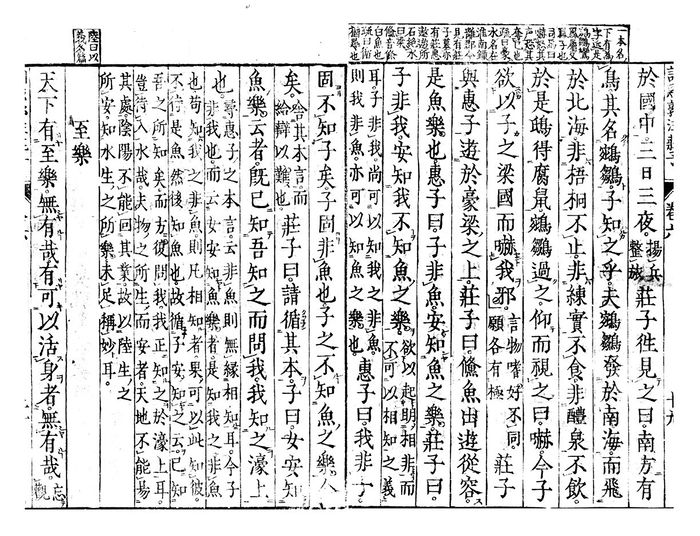"(Translation) 2019 知魚樂"의 두 판 사이의 차이
(→Translation) |
|||
| 41번째 줄: | 41번째 줄: | ||
*Discussion Questions: | *Discussion Questions: | ||
| − | + | ||
2019년 7월 9일 (화) 18:31 기준 최신판
| Primary Source | ||
|---|---|---|
 |
Title | |
| English | ||
| Chinese | ||
| Korean(RR) | ||
| Text Details | ||
| Genre | ||
| Type | ||
| Author(s) | ||
| Year | ||
| Source | ||
| Key Concepts | ||
| Translation Info | ||
| Translator(s) | Participants of 2019 JSG Summer Hanmun Workshop (Intermediate Training Group) | |
| Editor(s) | ||
| Year | 2019 | |
Original Script
Translation
Student Translation : Stella
莊子與惠子遊於濠梁之上。莊子曰:「儵魚出遊從容,是魚樂也。」惠子曰:「子非魚,安知魚之樂?」莊子曰:「子非我,安知我不知魚之樂?」惠子曰:「我非子,固不知子矣;子固非魚也,子之不知魚之樂全矣。」莊子曰:「請循其本。子曰『汝安知魚樂』云者,既已知吾知之而問我,我知之濠上也。
Zhuangzi and Huizi were taking a stroll on the bridge over the Hao River. Zhuangzi said, "Small fishes come out and float around leisurely as they please. This is the pleasure of fish." Huizi said, " You are not a fish, how do you know the pleasure of fish?" Zhuangzi said, "You are not me, how do you know that I do not know the pleasure of fish?" Huizi said, "I am not you; indeed, I do not know you. [But by the same token] you, of course, are not a fish, and [therefore] you cannot know the pleasure of fish, and that is all." Zhuangzi said, "Let us return to the beginning. Your asking [me] 'How do you know the pleasure of fish?' means that you, already knowing that I knew it, asked me. I knew it upon the Hao River."[1]
- Discussion Questions:
(YO)A very nice observation. Then could we suppose that Zhuangzi's last answer implies that the concepts of "how" and "where" may be considered as one capacity (as you said), through which knowing can take place? Can a language not distinguish how and where? I am not saying it can't; I am actually contemplating what it would be like if there is such a language.